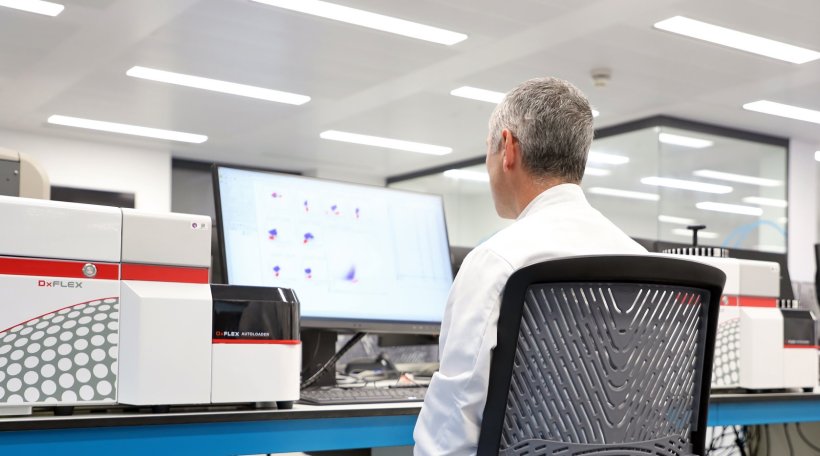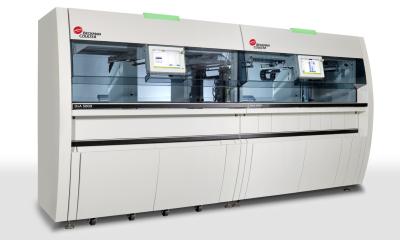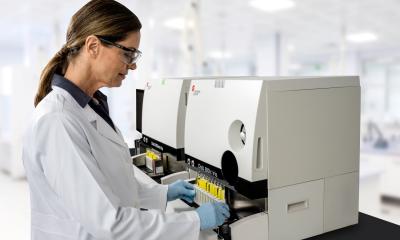Image source: Health Services Laboratories
Article • Sustainable workflows
Designing the laboratory of the future
How sustainability and paperless workflows are shaping scientific innovation
Guest article: Gavin Hirst, Clinical Flow Cytometry Account Manager, Beckman Coulter Life Sciences
The global conversation about sustainability continues to intensify, especially as countries across Europe are setting aggressive climate goals. Health systems are under more pressure than ever to improve their sustainability, especially as the European Union aims to be world’s first climate-neutral continent by 2050. Some countries’ health systems have individual goals that are even more ambitious, including England’s National Health Service, which aims to be net zero for emissions it controls directly by 2040.

Image source: Beckman Coulter Life Sciences
Health system laboratories are on the front line of the effort to reduce emissions, and thankfully there is help as new technology is enabling labs to digitize many of the processes that they traditionally performed manually. As this technology continues to improve, health systems can move closer to reaching Europe’s sustainability goals, while also becoming more efficient, accurate and productive, as these technologies can streamline workflows while reducing waste.
In flow cytometry, it’s now possible to fully automate sample preparation and testing, and to generate more information per tube than what was possible with older-generation technologies.
Beckman Coulter Life Sciences offers a range of such technologies, including dry pre-mixed antibody panels that can be run on an automated sample prep system with a capacity of up to 144 tests onboard, clinical flow cytometers with 13-color capability that allow more information per tube, and software that can process up to 20 million events in real time.
Reducing reagent waste
The benefits of these technologies for advancing sustainability goals have been demonstrated by Health Services Laboratories in the UK, which performs flow cytometry at five sites. The lab serves the UCH Macmillan Cancer Centre, running approximately 15,000 lymphocyte subsets, 2,000 lymphocyte function tests and 8,000 malignancy panels a year.
Health Services Laboratories created a collection of tubes that allow a fully automated set of panels for the diagnosis of acute and chronic leukemia and lymphomas while also utilizing reagents and analytical software from Beckman Coulter Life Sciences.

Image source: Health Services Laboratories
The improvement in sustainability resulted from a reduction in manual processes, said Naina Chavda, Blood Sciences Service Lead for Health Services Laboratories. “As the number of available antibodies increased, and the rate of diagnostic variances increased, our sample numbers increased and over half the staff was pipetting for the entire day. Our level of pipetting errors was high, which was our reagent wastage in failed assays,” Naina said. The technology eliminated the pipetting errors, reducing reagent wastage, she added.
Going paperless
Health Service Laboratories took its sustainability efforts a step further by setting out to build a totally paperless processing system. That required all raw data to be electronically transferred from the flow cytometers to the software system from Beckman Coulter Life Sciences, rather than printing the pages or having to manually transfer data via USB drives. After analysis, the histograms were not printed out for the clinician as they had been previously, but rather electronically transferred to the laboratory information system to be included with a fully integrated report.
The resulting reduction in paper usage is huge: in the past, a single complex case could result in upwards of 15 pages of histograms. In addition to the paper and ink resources required to print those reports, bookkeeping is also eliminated. Storage space would previously be a premium, as many of those reports would eventually sit in filling cabinets. Manual file maintenance adds extra time to laboratory staff’s daily duties, not to mention a manual pull of the reports and eventual purging. “In the hematological malignancy lab this is 95% decrease in paper usage,” Naina explained. “We used to use approximately 2,500 A4 sheets per week, which is nearly a box a week.”
Digitizing these reports also offers significant benefits to other professionals as well. “Pathologists can do more at their desk than they did in the past. They can look at the PDFs and enlarge them on the screen, if necessary,” Naina said. “They can open the analysis files from their workstations and request changes directly, rather than having to visit the lab and ask the scientists to make changes. It also means that follow-up tests can be ordered faster, allowing work to be done on a fresher sample, which is important and can positively shape the patient experience.”

Image source: Health Services Laboratories
Eliminating plastics
Another sustainability goal is reducing plastic use. High-parameter flow cytometers help advance this goal, because scientists can generate more information from each tube they run. That means fewer tubes and less plastic. Furthermore, it reduces reagent use, which results in cost savings.
Laboratories can streamline sample preparation and cocktailing in ways that greatly reduce plastic use. Beckman Coulter Life Sciences offers cocktails that are made-to-order based on research requirements, and can contain uniform dried reagents. This has helped some labs report a more than 30% reduction in consumables used. Another option is to deploy liquid dispensing systems which can make assays “tip-less” thereby reducing plastic waste, as there is no pipetting necessary to dispense the liquids. They’re also able to reduce manual cocktailing errors and eliminate the need for cold-chain shipping and storage, further advancing sustainability goals.
Productivity benefits
Improving the sustainability of labs offers benefits beyond advancing Europe’s net-zero ambitions. Going paperless, for example, gives researchers and clinicians the freedom to work off-site and the flexibility to respond to urgent cases that are reported outside of normal processing times.
Automated, paperless workflows also free up researchers and clinicians to spend more time doing the work that matters most to them. Previously, “analysis was complex and time consuming and only a handful of staff could do this, which included myself and one clinician,” Naina said. “Automation has allowed us to fully train all our staff to carry out this analysis, leaving the clinicians free to concentrate on reporting. We have improved timeliness. We no longer have to prioritize: We can process samples as they come in, as we have enough resources and staff to carry out the work.”
Having critical information in an instant can allow for critical split-second decisions, instead of having to make a trip to the laboratory library to find the information.
As leaders look to design the laboratory of the future, the ones that enable agility, flexibility and sustainability will be at the forefront, fueled by their commitment to accelerating answers that can ultimately benefit the patient experience and advance human health.
Profile:
Gavin Hirst is a clinical flow cytometry account manager at Beckman Coulter Life Sciences.
28.07.2025





